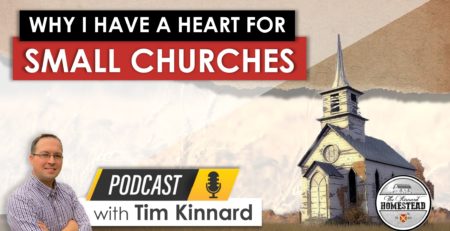
Homesteading to the Glory of God
Homesteading Hermits in Church History
Have you ever heard of a “hermit” before? Dating back as far as the third century A.D., many Christians have adopted a hermitic or monastic lifestyle as a way of isolating and insulating themselves from the corrupting influence of an increasingly sinful world. Actually, the practice can be traced back a lot further than that. The historian Josephus reports on a group of desert-dwelling Jews who committed themselves to voluntary forms of seclusion, poverty, and religious practice as early as the first century B.C. Some believe John the Baptist himself may have belonged in some way to such a community. Prior to John, we can point to the solitary examples of several Old Testament prophets.
Throughout church history there is an ongoing legacy of figures who choose to separate themselves from society-at-large to focus their lives exclusively in devotion to God. I could give you a long list of names of those who chose to live in such a way, from Clement of Alexandria and Origen, to Anthony and Basil the Great, to Jerome and Augustine, Benedict and Francis of Assisi.
During the time of the Middle Ages, Christian monasticism had become widely mainstream in the Catholic church with a handful of monastic orders in place, all adopting the same basic objective of honoring the Lord with their devote practices and manner of solitude. They designed their lives to give concentrated attention to the spiritual disciplines of prayer, fasting, singing, preaching, Bible reading, etc.
Of course, monastic life was more than just sitting around and reading one’s Bible all day. Those who lived in the monastery could delve into other projects as well. Scholasticism and artistry took off in many of these places. They had the opportunity to read libraries of books. They could write volumes and volumes of their own books to add to those libraries. They could develop certain crafts, whether that was weaving or woodworking, candle making or whatever it was. And then they could pass all of that knowledge down by apprenticeship and mentorship to the younger monks or nuns in their commune.
One interesting feature about a lot of these monasteries is that they maintained their own gardens, vineyards, and other means of production. In fact, some had become completely self-sustaining. They learned to grow their own food and to meet their own needs. Their self-reliance, again, was born out of an objective of being less affected by the sinful influences of society around them, which was ultimately born out of objective to live holy lives honorable to the Lord.
A Missional Approach to Homesteading
As I read about these sorts of figures in church history, I catch myself relating very much to the overall appeal of that kind of lifestyle—I suppose minus some of the vows that went along with it. We won’t get into all of those. But, as “homesteaders,” it struck me how my wife and I have chosen to pursue a somewhat similar quiet, self-reliant life out in the country. As I stopped to think about our reasons for leaving the city to break ground on our homestead, I admit, we’ve shared many of the same reasons that resonated in those early monasteries. I imagine there are a lot of fellow homesteaders out there who probably think the same way, whether or not they’ve ever thought about the historical parallel.
Like those early hermits and Medieval monks, we too have a genuine concern about the corrupting influence of culture around us, not only for ourselves but for our children. We also have our concerns about the increasingly secular and socialistic approach to life and economy being pushed by the culture, and the ultimate unsustainability of that approach. It’s made sense to us to step back a little from modern society and to return to some of those old-fashioned ways of life, including a more concentrated approach to the basic spiritual disciplines that are widely lax by so many.
I’m uncomfortable to relate our homestead to a monastery or a commune, but, at its heart, we have the same chief end—to glorify God and enjoy him forever, as the old catechism puts it.
Early on, Amy and I adopted I Thessalonians 4:11-12 as our inspirational verse to set the tone of what we’re trying to do out here. Sometime, I think I’ll do an episode that tries to break down in detail what the verse is all about. But to quote it to you, Paul tells the church to, quote:
“Aspire to live quietly, and to mind your own affairs, and to work with your hands, as we instructed you, so that you may walk properly before outsiders and be dependent on no one.”
Apparently, it is an intended Christian goal to aspire to adopt a simple quiet life, one relatively content, and hard-working, and self-reliant, as a way of setting a good Christian example to an unbelieving world. There’s a lot there we could reflect on. Again, I’ll save a full exposition for another day. But, for our family, that’s a good model.
One thing that should probably be emphasized here is the important balance that needs to be a part of such a way of life. While we are told to aspire to a self-sustaining and sanctified life, notice how that life is meant to be lived, in part, for the benefit of those “outsiders” watching how you live. In other words, we aren’t to be so isolated we have no contact with the outside world.
In fact, if you compare I Thessalonians 4:11-12 to other Scriptures, we’ve got to acknowledge the objective for the Christian isn’t just to give their attention to concentrated forms of devotion and worship, but a concentrated effort of evangelism and outreach too.
In Matthew 5:14-16, Jesus tells his disciples,
“You are the light of the world. A city set on a hill cannot be hidden nor do people light a lamp and put it under a basket but on a stand and it gives light to all who are in the house in the same way let your light shine before others so that they may see your good works and give glory to your father who is in heaven.”
I Corinthians 10:31 says,
So, whether you eat or drink, or whatever you do, do all to the glory of God. Give no offense to Jews or to Greeks or to the church of God, just as I try to please everyone in everything I do, not seeking my own advantage, but that of many, that they may be saved.
What does it mean to glorify God? It means, in whatever you’re doing—no doubt, that includes the self-reliant, homesteading life—do that with a purpose to see God glorified. And how will God be glorified? One of the ways he will be glorified is by ensuring your approach to homesteading is done in a way that is mindful of Jews and Greeks and the church for the sake of seeing them all reconciled to God by the same saving Gospel that saved you. It is by ensuring your approach to homesteading isn’t hidden under a basket in total privacy, but positioned on a lamp stand to offer a good source of light for others to see.
So, there’s got to be a balance, right? Yes, “live quietly and mind your own affairs,” and in the process, “allow your light to be visible to the world” for the sake of “seeing men saved,” all “to the glory of God.” I argue, that balanced approach can’t happen if you are completely isolated and cloistered away in your own private compound out in the country.
A biblical view of homesteading for the Christian must include an objective to bring glory to God not only in a homesteading family’s commitment to worship and serve him, but in a homesteading family’s efforts to see others committed to worshiping and serving him too.
With all of that said, that’s something we aim to do at The Kinnard Homestead. In addition to living quietly, minding our own affairs, working with our hands, and being dependent on no one as 1st Thessalonians 4 says, we want to do all of that in a way that points others to the Lord. That’s one of the big reasons we launched our YouTube Channel and Podcast, namely, to loudly proclaim Christ through the example of a quiet life…all to the glory of God.
If you haven’t already, we invite you to subscribe.












Comments (4)
Tim, I just wanted to give you some food for thought. Two of your statements jumped out at me: a) “I don’t think I could buy into those celibacy requirements”, and b) “Monastic life is more than just sitting around reading your Bible all day.”
It’s very easy to fall into the false pride & security of a “quiet self-sufficient” lifestyle that is NOT monastic. But you cannot separate the fruits of monastic living from monasticism itself. People try to do it by intellectual overrationalization and loophole-searching like the Pharisees, but it is not possible. All the scholasticism and artistry – it is only wholehearted dedication to the Lord allows all of these fruits in the first place.
The monks were not secluding themselves, they were actively witnessing through their lifestyle and shining brighter than any other community has ever done. By being celibate, they showed others that they were saving themselves for and serving something much greater than any worldly pleasure. I believe the only reason God has not smited the rest of our double-minded selves is because of the devotion of monks & nuns.
It is very easy to become like the Pharisees and indulge in intellectual loophole-searching and backsliding. Our faiths become very compromised living in the modern world and it is hard to realize it.
Thank you for the article and teaching me. I hope you reflect on my words as well!
Brian,
Thanks for the message! I didn’t mean to come across proud or judgmental. I personally have a lot of admiration for the monks. My understanding is not all (or most) even lived in complete isolation as hermits, which was really the stereotype I was speaking toward. Many monks and nuns very faithfully and actively ministered to their communities as “shining lights on a hill” (Matthew 5:16), as you mentioned. Their pious and ascetic lives, when visible to the public, also serve as a great witness against the largely hedonistic living of most of the world.
The temptation I know I would face in monastic life, and, honestly, a temptation I believe many monks have faced over the centuries (again, not all, but some), is the tendency to keep to oneself for the sake of piety at the expense of being missional, which is arguably the reason God’s servants are on the earth in the first place (Matthew 28:16-20). I know as a Christian homesteader, this is my struggle.
To be fair to the realities of human nature, though, there is just as equally a temptation to live piously in the public eye for proud and selfish reasons as Matthew 6:1-2, 5-6 warns about. With this in mind, the pattern of practicing one’s spiritual disciplines in the secrecy of a monastery is a commendable thing.
Perhaps the point to settle on is that a “balance” is warranted. We should neither be complete isolationists, nor should we be so acclimated in the world that we are indistinguishable from the world. We should both place ourselves “on a stand” (Matt. 5) and “beware of practicing our righteousness before other people in order to be seen by them” as “the hypocrites” (Matt. 6).
Thank you again for your comments! You make great points.
Tim
Do you know of any biblical homesteading curriculum for like a small group?
I watched the back to Eden documentary and it got me interested.
Pam, thank you for your question. I can point you to Noah Sanders and his training material over at http://www.redeemingthedirt.com
I’ve enjoyed reading and following his work.